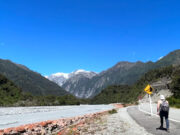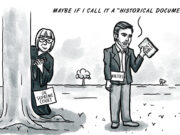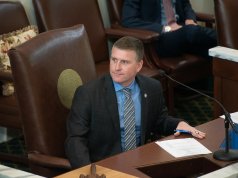Leonardo DiCaprio surely knows the limited effect a celebrity “cause” documentary about global warming will have on the average viewer — the actor himself admits that he’s pessimistic (“It all kind of seems beyond our control”). Even a good liberal will have a tough time squeezing DiCaprio and Fisher Stevens’ skillful documentary Before the Flood into their Facetime schedules. But the Titanic star forges on anyway to document a different sinking ship: the planet Earth.
DiCaprio has been committed to Earth Day causes since being schooled by Al Gore in the ’90s. It’s impressive to see him keep the message close to his heart, and Before the Flood one ups Al Gore’s earlier documentary in two ways: by showing that the Wolf of Wall Street can speechify to a heretofore complacent United Nations; and by traveling straight to the leading minds of environmental science and victims of global warming today.
Unafraid of proffering a potentially unpopular point of view, DiCaprio singles out fossil fuels as the cause of global warming. While touring the Suncor Energy oil/tar pit in Alberta, Canada, DiCaprio tells the company’s senior vice-president that the seething pits that replaced acres of Boreal forest “kind of looks like Mordor.”
Of Florida, Oklahoma and India
DiCaprio interviews layman, oil man and politician alike, and he’s not half bad at that, either — further proof of a passion that comes from a place beyond charisma.
Through a well-paced, if pro forma, documentary structure, DiCaprio travels wide in search of scope, but he doesn’t have to travel far to show Miami succumbing to rising waters. The mayor of Miami Beach, Philip Levine, explains the random floods that pump out of the city’s drains as a result of rising sea levels.
DiCaprio also visits the office of a veteran climatologist who says a drought in Oklahoma will be twice as intense in 10 years at the current warming rate. DiCaprio’s wisest stop, though, is his most challenging one: In India, most of the villages he tours lack electricity.
Sunita Nurain from Delhi’s Centre for Science and Environment comes across as unimpressed by the Oscar-winning actor when she points out the U.S.’s empty promises of moving to solar while both the U.S. and India burn up large reservoirs of coal. Nurain says American NGOs ask her why the world’s poor don’t move to solar and avoid making the mistakes we have made, a line that turns her voice emotional.
DiCaprio: “We have to practice what we preach, absolutely.”
Nurain: “I am sorry to say this, I know you are an American, and please don’t take this amiss. But your consumption is going to really put a hole in the planet. And that’s the conversation we need to have.”
Climate deniers oppose solutions
The film offers common sense solutions. Politically, the answer is a carbon tax, but the antagonists are politicians like Florida Gov. Rick Scott and Oklahoma U.S. Sen. Jim Inhofe. Inhofe continues to deny climate change while accepting lobbyist dollars from the fossil fuel industries, while Scott neglected to bring federal dollars home to fix Miami’s water-battered roadways.
The documentary escapes DiCaprio’s initial pessimism by identifying and diagnosing a political problem. A Harvard economist, Gregory Mankiw, who advised former President George W. Bush, estimates that climate change has cost America $44 trillion. We could shift the payroll tax onto a carbon tax, he notes. While these taxes poll terribly, Mankiw posits that when people want something bad enough, then the politicians will become “our elected followers.”
Another practical solution DiCaprio settles on is our individual consumption of meat. The cows that we eventually eat in the form of beef and other products initially occupy half our land mass. As they’re grown, the herds release loads of methane when they graze.
DiCaprio’s sourcing and travels are so wide ranging and his questions so humble and clear-sighted that viewers can’t help but be impressed, even if they are being reintroduced to phenomena they already agree are problematic. The ultimate cost of our inaction is already being felt by the world’s poor, and this documentary finds it elsewhere, too.
The first and last impressions of Before the Flood (with a score by Trent Reznor and Atticus Ross) also thread the public-service initiative with the filmmaker’s artistic consciousness — notable in light of DiCaprio’s private nature.
When he was a child, his hippie father placed not a conventional mobile over his crib but Hieronymous Bosch’s triptych The Garden of Earthly Delights, which depicts the multitude of teeming life (sinful and sacred) in the first two panels before veering into a ravaged, dark landscape in the third panel. Bosch is clearly a genius painter, one of the best, but the intensity of DiCaprio’s relationship to the paintings still takes one aback. Bosch comes up again when DiCaprio gives the Pope a Bosch coffee table book before the religious leader issues a call-to-arms on climate change.
A final note: Silently complicit Okie viewers should beware. At the 1:11 mark, DiCaprio blatantly juxtaposes shots of himself against clips of Oklahoman Inhofe, chairman of the EPA’s oversight subcommittee, doing his unique brand of climate-change denial on Fox News.
Regardless, the documentary is worth watching.
(Editor’s note: Before the Flood was available for free on YouTube through Tuesday, but now costs $3 to purchase.)





















